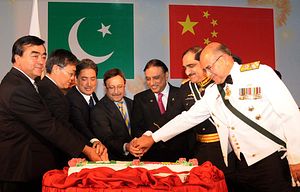On February 9, China’s assistant foreign minister, Liu Jianchao, joined his Afghan and Pakistani counterparts in Kabul for the first round of a new trilateral strategic dialogue. The dialogue, attended by Liu, Pakistani Foreign Secretary Aizaz Ahmad Chaudhry, and Afghan Deputy Foreign Minister Hekmat Khalil Karzai provided a tantalizing glimpse of what trilateral cooperation between these neighbors could mean for Afghan stability.
As Chinese Foreign Ministry spokesperson Hua Chunying noted in her press conference today, Afghanistan’s security situation was “a major topic” at the trilateral dialogue. All three countries “reaffirmed their commitment to [the] peace and stability of Afghanistan and the region” and China and Pakistan emphasized their support for a peace process “led and owned by the Afghans.”
Though the emphasis was on security, most of the deliverables from the meeting were actually in the economic realm, where China is most comfortable. China committed to helping build a hydro-electric dam on the Kunar River and to constructing new road and railroad connections between Afghanistan and Pakistan. The Kunar dam, to be constructed within Afghanistan but close to the Pakistan border, is expected to provide electricity for both countries.
Indeed, the whole theme of the meeting seems to have been greater Afghan-Pakistani cooperation, facilitated by China. Afghanistan’s representatives at the talks specifically asked China to “play a constructive role in promoting bilateral interactions between Afghanistan and Pakistan,” according to Hua. China has a close relationship with Pakistan, often described as an “all-weather friendship.” Kabul hopes that China can use its unique ties with Islamabad to pressure Pakistan into playing a constructive role in Afghan security. Afghanistan in particular wants Pakistan to nudge the Afghan Taliban into negotiations over a true unity government – rather than supporting the group’s more militant ambitions.
Beijing itself hosted representatives from the Taliban last year, in what was widely read as an indication China is willing to play the role of mediator in negotiations. But Afghan officials believe that Pakistan will have to be at the table as well and they hope China can help convince its ally to join the negotiations in good faith. Chinese Foreign Minister Wang Yi will be in Islamabad later this week; Kabul will be watching closely.
U.S. officials interviewed by the Wall Street Journal believe that China is ready to become more politically involved in promoting Afghan security – both through mediation and through more concrete measures such as stepping up the training of Afghan troops. However, the recent trilateral dialogue mostly limited itself to economic commitments. Promoting economic projects that will link Afghanistan and Pakistan has undeniable political ramifications, but still relies on the tools (investment and aid) China has grown accustomed to using around the world.
Outside of economic deals, China, Pakistan, and Afghanistan committed to broadening their cooperation on counter-terrorism, but there are no specifics on how the countries will do so. All three countries have suffered from deadly terrorist attacks in the past year and remain concerned about the growing influence of jihadist militants groups (including not only the Talban but Islamic State, which has been ramping up its activities in the region as well).

































